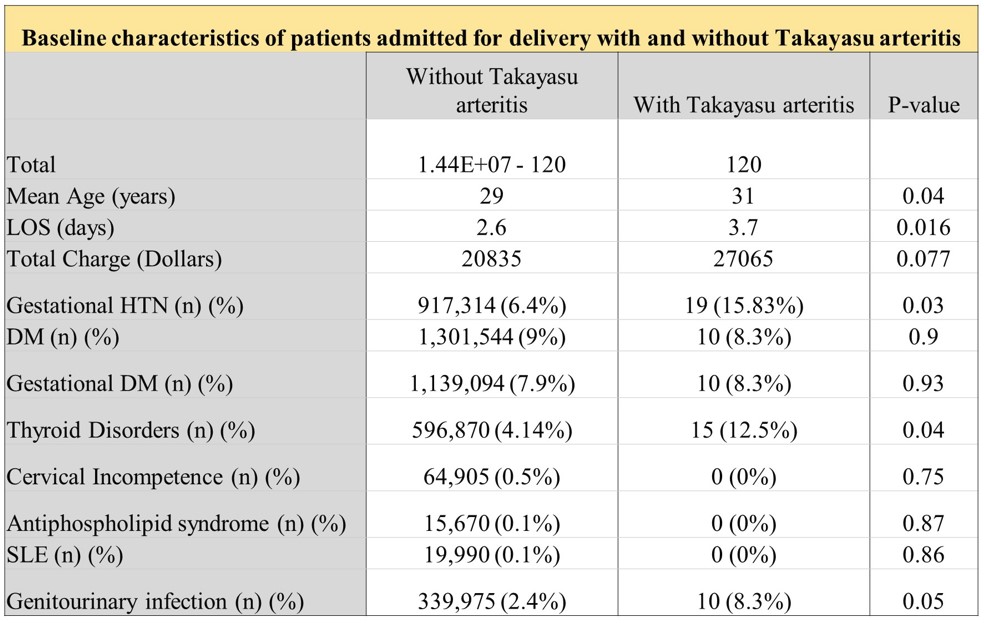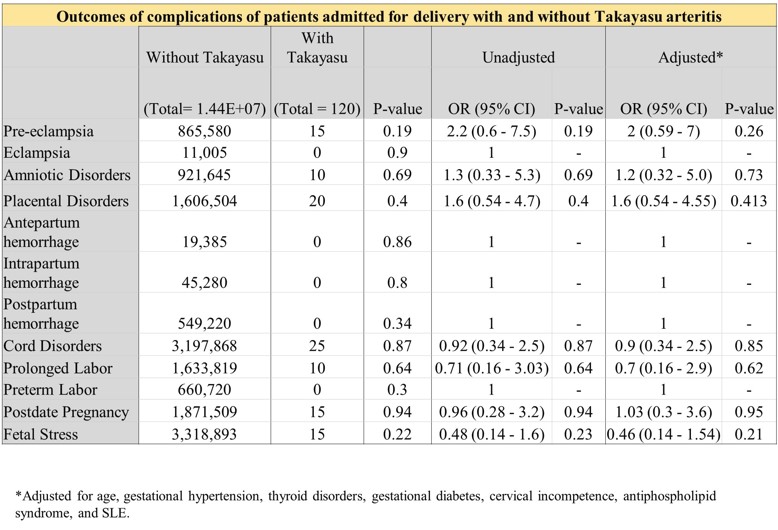Session Information
Date: Monday, November 13, 2023
Title: (1345–1364) Reproductive Issues in Rheumatic Disorders Poster II
Session Type: Poster Session B
Session Time: 9:00AM-11:00AM
Background/Purpose: Takayasu’s arteritis (TA) is a large vessel vasculitis which affects women of reproductive age. There is limited information about the effect of TA on pregnancy. We ran an analysis in pregnant women with an already established diagnosis of TA in an effort to determine the effect of TA on delivery outcomes.
Methods: We queried the National Inpatient Sample database in the period between 2016 – 2019. Patients who were admitted for delivery were identified and stratified based on the presence of diagnosis of TA. The adjusted odds ratios (aOR) of in-hospital outcomes and resource utilization were calculated using chi-square statistics in software STATA v.17.
Results: Of 1.44e+07 hospitalizations for pregnancy between 2016-2019; 120 pregnant patients had TA. The mean age of TA patients was older (31 vs. 29, p-value 0.04). Patients with TA had significantly higher rates of gestational hypertension (15.83% vs 6.4%, p-value 0.03), thyroid disorders (12.5% vs 4.14%, p-value 0.04), genitourinary infections (8.3% vs 2.4%, p-value 0.05) and longer length of stay (3.7 vs 2.6 days, p-value 0.016) compared to controls. The risk of pre-eclampsia trended higher, however was statistically insignificant (aOR 2, 95% CI 0.59-7.0, p-value 0.26). There was no difference in the rate of amniotic or placental disorders, ante/intra/postpartum hemorrhage, cord disorders, prolonged/preterm/postdate pregnancy or fetal stress.
Conclusion: While TA patients had a significantly higher rate of comorbidities: gestational hypertension, thyroid disorders, and increased incidence of genitourinary infections, TA does not seem to cause adverse outcomes during the delivery period. Interestingly, TA patients were older than non-TA patients.
To cite this abstract in AMA style:
Raksadawan Y, Polam A, Chaisrimaneepan N, Usmani S. Similar Delivery Outcomes in Pregnant Patients with and Without Takayasu Arteritis – A Nationwide Inpatient Database Study [abstract]. Arthritis Rheumatol. 2023; 75 (suppl 9). https://acrabstracts.org/abstract/similar-delivery-outcomes-in-pregnant-patients-with-and-without-takayasu-arteritis-a-nationwide-inpatient-database-study/. Accessed .« Back to ACR Convergence 2023
ACR Meeting Abstracts - https://acrabstracts.org/abstract/similar-delivery-outcomes-in-pregnant-patients-with-and-without-takayasu-arteritis-a-nationwide-inpatient-database-study/


